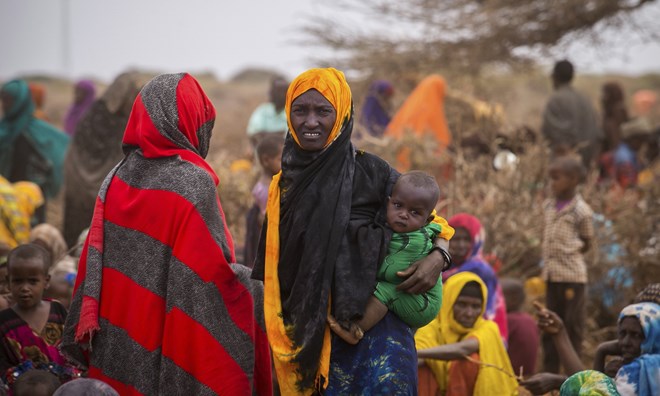Ahmed Ibrahim
Tuesday March 21, 2017

The wide-reaching drought and extreme food insecurity in the horn of Africa’s effects are significantly felt in Somalia. In all the parts of the already challenged country the phenomenon is characterized by loss of lives, outbreak of communicable diseases, massive loss of livestock and livelihoods, displacements and logistical/security access challenges to reach the most affected populations in the areas. Even though current drought is receiving media attention with strong government backing, philanthropic organized youth groups, international community, donor countries, diaspora communities and most recently global celebrities calling support to avert possible famine in the country, humanitarian responses in most of the drought affected area are relatively slow .
As expected, the displaced families mainly women and children are seeking refuge in the existing displacement settlements areas on the outskirts of the major cities where access to humanitarian and philanthropic support is better.
The Somali community’s cultural tradition to assisting those in need is being displayed by all members of the society including students, youth groups, business community, religious leaders and government. However, the gatekeeping phenomenon too thrives in such occasions, Gatekeepers (Horjooge) are mostly land broking structures that control inhabitance and access to the IDP settlement around the major town, they’re predominantly from the hosting communities, and mostly they parasitically exploit and extort the unsuspecting families, mostly from rural setting and with limited understanding of complex Extortionary arrangements in the settlements.
To the service providers they pose as benevolent good Samaritans providing refuges to the distressed displaced family which almost always far from the reality.
They forcefully confiscate the aid from the beneficiaries, ask percentage of share from the service providers, create exaggerated needs (BuushBaris and parading innocent women and children in the sun all day) and in end sell supplies to traders who are already waiting in the site.
The gatekeepers are well connected to humanitarian workers, local government authorities and security officials in addition to having interconnected and coordination approaches to dealing with all the different stakeholders.
From the few interactions in the past week with service providers especially the Afgoye corridor, its apparent that the gatekeepers are posing some colossal access impediments to reaching the affected families directly. Clearly amidst the high profile resource mobilization, there is need for urgent strategies that lead of progressively phase-out gamekeepers however, they need to be applied progressively and with caution, to minimize the risk of rejection of the approach by gatekeepers, which would negatively impact the protection and security of IDPs.
Some of the longer-term strategies of curbing this behavior includes stakeholders working the government to develop a comprehensive land policy and bolstering the capacity of the national institutions dealing with displacement (NCRI and DMA).
But in the shorter-term, if this menace isn’t dealt with decisively, the coordinated national and international efforts to save lives will be fruitless as the aid will be going to the wrong persons and ending up in the markets again. Thus, its recommended that this be giving highest attention possible, statement by the Prime minister, the religious leaders heading GurmadkaAbaaraha campaign, insuring coordinated transparent and dedicating security for displaced persons.
By All means, this deep rooted menace has to be stopped:
Twitter: @ahmedvision1